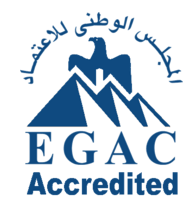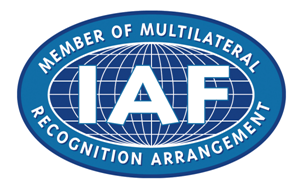


AL-NOOR GROUP | We uphold the highest standards in both our certification, inspection, training, methods and our business practices, and maintain unquestioned integrity in the reports and certificates that we provide to you.
AL-NOOR GROUP | All accreditations are granted to the legal entities operating within AL-NOOR GROUP. Each accreditation has a defined scope and is site-specific. Please contact the respective accreditation body or the view our accreditations herein listed.


The Egyptian Accreditation Council was Established by Presidential Decree No. 312 for Year 1996 to Become the Only National Body Competent in the Arab Republic of Egypt to Evaluate/Assess and Accredit Conformity Assessment Bodies, which are (Testing Laboratories/ Calibration Laboratories / Inspection Bodies / Certification Bodies of Management Systems / Medical Testing Laboratories / Product Certification Bodies/ Technical Proficiency Testing Service Providers /Proficiency Testing Bodies/ Personal Certification Bodies/ Halal Certification Bodies/ Forensic Laboratories /Biobanks Laboratories).
The International Accreditation Forum (IAF) is a worldwide association of accreditation bodies and other bodies interested in conformity assessment in the fields of management systems, products, processes, services, personnel, validation and verification and other similar programmes of conformity assessment.
AL-NOOR GROUP Certification is always a perfect choice because we always strive to understand your demands and work hard to achieve them , we also feel our commitment towards our customers and that we are responsible to do our work with most acceptable quality and in good time and distinguished cost .
Yes, it can. This usually happens when an organisation becomes dissatisfied with the service provided by a certification or the fee it charges. Perhaps the quality of the audits or auditors is not as would be expected, additional ‘extra’ fees are being added to invoices, or the certificate does not display a valid accreditation mark? For companies wishing to enter international markets or win an important client, an accreditation mark, such as EGAC, can play a crucial role.
The world’s Accreditation Bodies are those bodies who are offiailly formulated by thier govornments , together they created an international forum in Australia with the name if International accreditation forum IAF , they signed together an agreement to allow each other to work internarionally with no obsticles , this agreement calles the multilateral agreement .
that mean any accrediation body who is member in IAF can issue ISO certificates in any country who is member in the MLA in IAF with no any kind of problems .
AL-NOOR GROUP Certification is Accredited by EGAC in Egypt , EGAC full member in IAF and signed the MLA at IAF .
It gives value and credence to the certification. An accredited certificate is usually the only type accepted in tenders for new business.
Accreditation is the approved recognition of a certification body to perform certifications against different standards. Every country has its own regulated accreditation body. These bodies issue accreditations to certification bodies such as AL-NOOR GROUP Certification. Accreditation is achieved by demonstrating prescribed controls and systems are in place. These requirements are also defined by international standards (for systems certification this is ISO 17021).
ISO is an abbreviation for the International Organization for Standardization based in Geneva. This organisation issues international standards called ISO.
Certificates for a limited time period, usually for three years, are issued by an accredited certification body. In order to keep the certificate valid, a periodic audit is performed, typically once a year. If fundamental deviations from the standard requirements are discovered, the extreme measure of the certificate withdrawal can be applied. This is a very rare, exceptional and unpleasant situation. Therefore, when a company decides to implement and follow an ISO standard, it is a voluntary commitment to continuous improvement and development, which is worth the company’s effort.
Al Noor Lab is a nationally accredited laboratory in
food analysis ISO / IEC 17025: 2017 according to the
standard. The laboratory performs examination and
analysis services for samples of food commodities for
the public, inspection and review companies, factories
and food companies, in addition to hotels, restaurants,
hospitals and all parties concerned with the application
of food safety conditions. For more details about the
services of the
#Al-Noor Lab
- Total Plate Count
- Enterobacteriaceae
- coliform
- Escherichia coli
- staphylococcus aureus
- Yeast and mold
- Salmonella
- Listeria
Environmental Swabs
- Total Plate Count
- Enterobacteriaceae
- coliform
- Escherichia coli
- staphylococcus aureus
- Yeast and mold
- Salmonella
- Listeria
Air Efficiency
- Total Plate Count
- Yeast and mold
- Ph
- Condactivity
- TDS
Providing chemical and microbiological examination and analysis
services for food commodities and water samples to the public and
the following bodies:
1- Food companies and factories
2- Farms, fertilizers and feed
3- Import and export companies
4- Petroleum and oil companies
5- Hypermarket
6- Hotels and restaurants
7- Tourist villages
8- Hospitals
9- Private water companies
10- Examination and auditing companies
Copyright © 2023 AL-NOOR GROUP, All rights reserved.